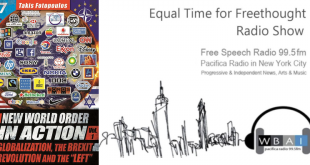TAKIS FOTOPOULOS *
(25.08.2014)
Abstract : In this article it is argued that, in the era of globalization, a new kind of growth economy has emerged, which is based on an enforced de-growth and a dual consumer society that makes irrelevant in the foreseeable future the ecological approaches relying on an assumed growing scarcity of energy resources. Furthermore, economic localism and the relevant transitional strategies are made redundant and the need for a new strategy becomes imperative.
Few now doubt that major structural changes are taking place within the New World Order (NWO) of neoliberal globalization. These changes are not, in fact, related to the 2008 financial crisis, as Paleolithic Marxist approaches suggest. In reality, the financial crisis, which functioned as the catalyst for the present economic catastrophe imposed on peoples such as the Greeks, was merely a symptom of neoliberal globalization.[1] Neither of course are related to the supposedly radical changes brought about by the financialization of the economy that is claimed to represent “a new historical period in the development of capitalism,” in which globalization is simply “a notable feature of the historical period of financialization”![2] Clearly, such a completely disorienting approach is based on a highly distorted view of the current reality that ignores the dominant phenomenon of our time: the creation and subsequent domination of transnational corporations and thus, inevitably, of neoliberal globalization, as the economic dimension of the NWO.[3] No wonder in this completely a-historical approach there is neither a NWO nor a Transnational Elite (TE) ― basically, the elites in G7 ― which administers it. This presumably implies that the frequent wars of this elite in the last two decades or so were just due to intra-imperialist conflicts, although one would then be curious to know how exactly the entire TE managed to be remarkably and unprecedentedly united in all these wars (apart from the tactical division with France on the invasion of Iraq).
Neither do these structural changes refer to the various ecological approaches, such as the relatively recent de-growth approach.[4] On the basis of such approaches, which mainly rely on the fundamental premise that growth for growth’s sake is unsustainable as it pushes the limits of the biosphere, one could draw the conclusion that it is the growing scarcity of resources (particularly of energy resources), which indirectly caused the financial crisis and historically has led to a long-term capitalist crisis. Yet, as I tried to show elsewhere,[5] neither the history of capitalist development since the Industrial Revolution, nor present developments, are consistent with the scarcity of energy approach. Particularly so today, in the globalization era, when it is obvious that an enforced kind of de-growth is being imposed “from above,” by the TE, as a result of the development of a new type of growth economy emerging in the NWO.
Thus, in contrast to the old type of “growth economy” founded on a mass consumer society, the new growth economy relies on growth for the few and de-growth for the rest and the corresponding consumption patterns of a new dual consumer society, that is:
- The usual consumer society, which, however, covers now only the needs (most of them being created by the consumer society itself) of the privileged social strata that benefit from globalization in both the “North” and the “South” ― a small minority of the world population;
- The emerging today new “subsistence consumer society” covering the needs (mostly basic needs) of the rest of the population, which is condemned to permanent unemployment or low wages/ salaries/ pensions, zero-hours contracts, part time or occasional employment etc.
Of course, this is a distorted kind of de-growth, as the elements of sharing, co-operation, etc., stressed by the de-growth approach (which are of course irrelevant to the system) are missing. However, the final ecological effect is very important, as the new growth economy could significantly reduce pressure on energy resources for the foreseeable future. Furthermore ― crucially, for the system ― this could be achieved without the need to abolish the “growth economy” itself, as radical ecologists have always demanded on the basis of projections for the scarcity of resources based on the old kind of growth economy, i.e. projections which are clearly irrelevant to today’s reality. Needless to add that this “success” is paid for by the lower strata who are the main victims of globalization.
Thus, the de-growth debate is not only irrelevant to the present reality but is also disorienting, especially as far as the victims of globalization are concerned, since, it indirectly justifies the various austerity policies imposed by the NWO of neoliberal globalization. But, although the ideologues of neoliberal globalization do not dare to justify austerity policies on the basis of ecological rationality, the present enforced de-growth does create a relevant perverse effect. Many people in the middle class, worrying about the ecological crisis (usually, having sorted out first their own survival problems, being among the beneficiaries of globalization themselves), would surely find this new kind of growth economy useful on account of this ecological “alibi”. This, in turn, could well function as an additional reason to vote for the parties on which the local parliamentary juntas imposed by the NWO rely on for their power base.
However, it is not just the “limits to growth” and the corresponding ecological approaches, including the de-growth approach, which have become irrelevant, if not disorienting, in the NWO. Their transitional strategies, which were based at the local level in order to build an alternative ecological society (or in the case of the ID approach, an ecological democracy), have also become incompatible with present reality. Radical decentralization within the institutional framework of the internationalized market economy ― whether such decentralization is realized through eco-villages, or urban villages, or even local “IDs in action” ― is impossible today. “Economic localism,” i.e., the change in production relations, through the creation of self-sufficient or even self-reliant communities, is non-feasible as long as the transnational corporations and their subsidiaries are spread into every community of the countries integrated into the NWO. But, if economic self-reliance is impossible today even at the national level, unless national and economic sovereignty has been restored first, one could imagine how feasible such self-reliance is at the local level (unless one talks about a Robinson Crusoe kind of self-reliance!)
The inescapable conclusion is that the aforementioned structural changes of countries integrated into the NWO signal the need for a fundamental shift in the strategies aiming to radical social change. This is because, today, is missing even the minimal degree of national and economic self-determination needed for the creation of “popular bases of political and economic power,” either at the local or the national level. It is therefore obvious that social struggle in the globalization era, as I tried to show elsewhere,[6] has to be primarily about the re-creation of this minimal degree of national and economic self-determination, (i.e. conquering national and economic sovereignty) as a precondition for any radical (systemic) change.
* This article is an edited and expanded version of an article that was first published in TF’s weekly column in Sunday’s Eleftherotypia (a Greek daily published in Athens) on 24/8/2014. The translation into English was edited by Jonathan Rutherford.
[1] See Takis Fotopoulos, “The myths about the economic crisis, the reformist Left and economic democracy,” The International Journal of Inclusive Democracy, Vol. 4, No. 4 (October 2008).
[2] Jennifer Tighe, “Costas Lapavitsas Discusses the Financialization of Capitalism,” Verso (28/01/2014). See, also, C. Lapavitsas, “Globalization or Financialization” (in Greek), Iskra (24/8/2014).
[3] Takis Fotopoulos, “Globalisation, the reformist Left and the Anti-Globalisation ‘Movement’”, Democracy & Nature, Vol.7, No.2 (July 2001)
[4] See the de-growth debate, The International Journal of Inclusive Democracy, Vol. 3, No. 1 (January 2007) and the de-growth debate revisited, The International Journal of Inclusive Democracy, Vol. 6, No. 4 (Fall 2010).
[5] See Takis Fotopoulos, “Disaster theories and the crisis: the peak oil case,” The International Journal of Inclusive Democracy, Vol. 7, No. 2/3 (Summer/Autumn 2011).
[6] Takis Fotopoulos, “The imperative need for popular fronts of national and social liberation in the globalization era” (in this issue).
Source: http://www.inclusivedemocracy.org/journal/vol10/vol10_no1-2_The_new_growth_economy_Fotopoulos.html
 ANTIGLOBALIZATION – SELF-RELIANCE – INCLUSIVE DEMOCRACY Building Popular Fronts for National and Social Liberation (FNSL): for a Democratic Community of Sovereign Nations towards an Inclusive Democracy
ANTIGLOBALIZATION – SELF-RELIANCE – INCLUSIVE DEMOCRACY Building Popular Fronts for National and Social Liberation (FNSL): for a Democratic Community of Sovereign Nations towards an Inclusive Democracy







